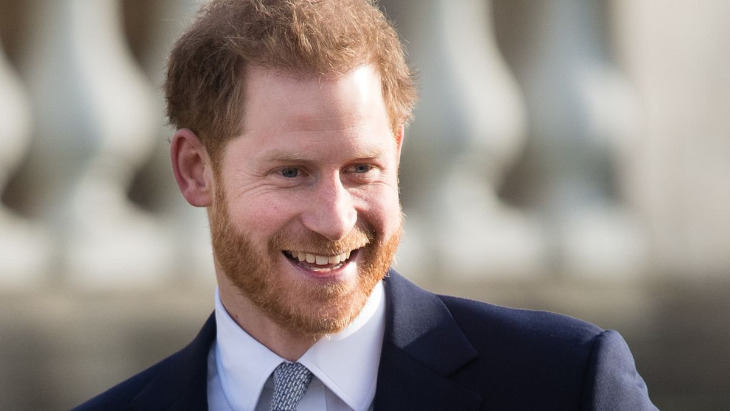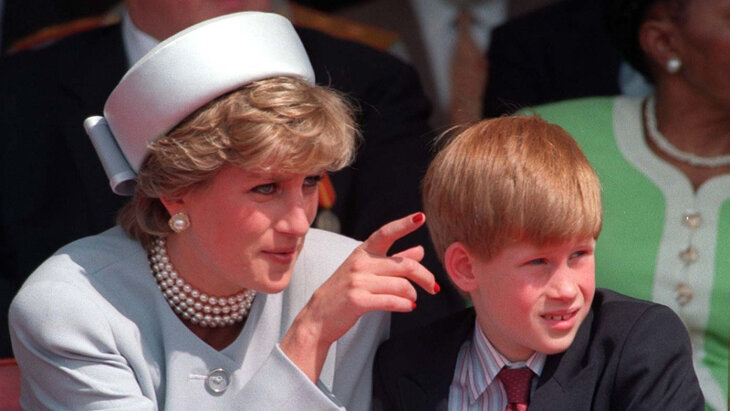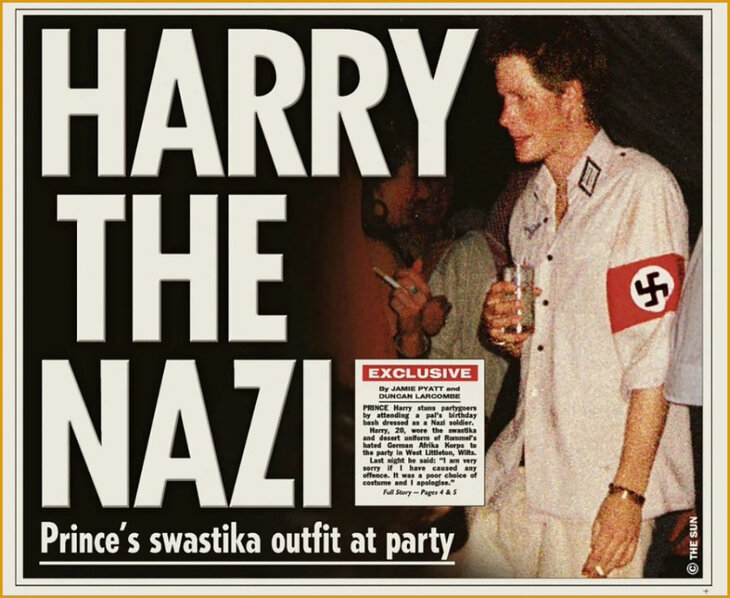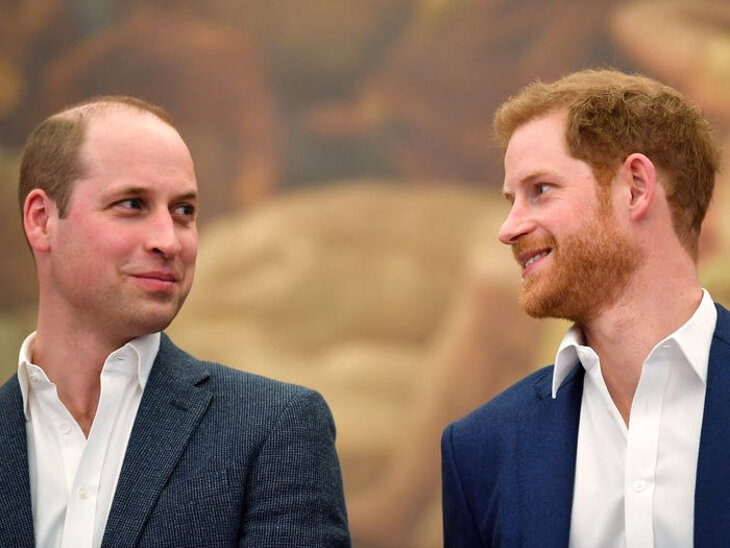 Vampire Weekend's Surprising Jewish Stories
Vampire Weekend's Surprising Jewish Stories


7 min read
"Spare" describes a lifetime of pain.
Prince Harry’s memoir Spare is painful to read; on virtually every page, he describes a life filled with psychic pain. The book, ghostwritten by American author J.R. Moehringer, sometimes reads like a compilation of a lifetime’s worth of grudges. It opens with a quote from Faulkner, “The past is never dead. It’s not even past.” In over 400 pages, Harry details a lifetime of insults, slights and grudges that have profoundly shaped the man he is today.
Some of Harry’s complaints seem frivolous and have been mocked or criticized since his book came out. (He describes, for instance, when he and his older brother Prince William visited their grandmother Queen Elizabeth II at her castle Balmoral in Scotland, that William got a bigger bedroom.) Other descriptions are searing in their sadness: the night a 12-year-old Harry was woken up to be told that his mother, Princess Diana, had died, he was left all alone until morning with no one to comfort him.
Spare is a cri de coeur, a blistering attack on the institution of the British royal family and elements of the British and international media as well as us, its avid consumers. Here are five Jewish lessons we can learn from this international bestseller.
“Death and life are in the power of the tongue” writes King Solomon, said to be the wisest man in the world (Proverbs 18:21). Speaking badly of other people is akin to murder.
The heartache that hangs over Spare is Princess Diana’s violent death in 1997, when the car she was riding in sped along a Paris underpass in a vain attempt to evade reporters who were hounding her and crashed. (Her driver was later shown to have been intoxicated.) That tragedy changed Prince Harry’s life, giving him a lifelong antipathy towards the press. Later on, he describes how his every misstep was seized on in the newspapers and sometimes even embellished.

His wife Meghan Markle has been harassed and reduced to tears by aggressive reporters. Reading Spare is a master lesson in the very real harm of treating other people as fodder for gossip, instead of real, complex human beings deserving of respect.
In publishing his memoir, Prince Harry is perpetuating this painful and damaging cycle.
The Talmud describes three victims each time gossip is spoken about other people: the speaker, the object of gossip, and the listener. Hearing and sharing gossip inures us to its dangers. Ironically, in publishing his memoir, Prince Harry is perpetuating this painful and damaging cycle: his book is filled with negative and unflattering descriptions of his closest family members. Publishing this memoir will make any reconciliation with his family more difficult.
One of the most moving episodes in Spare describes Prince Harry’s decision in 2005, when he was 21 years old, to attend a costume party wearing a fancy-dress Nazi uniform, complete with a swastika armband and a Hitler mustache.

In his book, Harry attempts to deflect blame for this decision. He claims he doesn’t remember much about his actions in the costume rental store, describing how his memory has had holes in it and blank moments ever since his mother’s death. He also describes calling his brother Prince William and his then-girlfriend Kate and asking what they thought. “Nazi uniform, they said,” when he presented them with his choices. He claims that he desperately wanted to make his future sister-in-law Kate laugh and this was an ideal way. Nowhere does he apologize, though he does describe feeling “self-loathing” afterwards, once a photo of him in costume was leaked to the press.
After the party, a deeply ashamed Prince Harry phoned his father, King Charles, who seems to have dismissed the episode as an example of typical youthful poor judgment. A few days later, King Charles asked Prince Harry to visit Rabbi Jonathan Sacks, then the Chief Rabbi of Britain. Harry recalls that Rabbi Sacks spoke to him with love and understanding, and urged him to use his humiliation to grow and become a better person:
He condemned my actions. He wasn’t unkind…He also placed my stupidity in historical context. He spoke about the six million, the annihilated. Jews, Poles, dissenters, intellectuals, homosexuals. Children, babies, old people, turned to ash and smoke.
A few short decades ago.
…He urged me not to be devastated by my mistake, but instead to be motivated. He spoke to me with the qualities one often encounters in truly wise people - forgiveness…. He told me to lift my head, go forth, use this experience to make the world better. To become a teacher of this event…
Sadly, this is one of the most gentle and lovingly delivered pieces of advice that Prince Harry describes in his entire, kaleidoscopic book.
The most devastating pain in Prince Harry’s memoir is described in its title, Spare. “Two years older than me, Willy (Prince William) was the Heir, whereas I was the Spare. This wasn’t merely how the press referred to us… This was shorthand often used by Pa and Mummy and Grandpa. And even Granny. Their Heir and the Spare - there was no judgment about it, but also no ambiguity. I was the shadow, the support, the Plan B. I was brought into the world in case something happened to Willy….”
This situation in this description is devastating in its cruelty, and is diametrically opposite to a Jewish worldview in which every single person is infinitely precious and created in the image of God (Genesis 1:27). The coldness that Prince Harry described growing up, and the psychological damage it wrought on him, is his indictment of his royal family. For the rest of us, it’s a cautionary reminder never to take other people for granted.
Prince Harry describes how he lacks this same interest in his own royal family’s history. Even the exploits of his own great great grandparents fail to interest him. It’s a situation that’s familiar to many of us, including in the Jewish community. Jews have a rich and compelling heritage. Like Prince Harry, many Jews today are disinterested and don’t put in the effort to learn more about it.
In one tender passage, Prince Harry provides an antidote, describing the love that his father has of British history and culture. He describes watching his father give a speech calling for British students to study Shakespeare, peppering his speech with quotes from various Shakespearean plays. “It was showmanship, but not in an empty way,” Prince Harry described. “He was making the point: You should all be able to do this. You should all know these lines. They’re our shared heritage, we should be cherishing them, safeguarding them…”
Your life is enriched through learning about your history.
Perhaps the saddest aspect of his memoir is the rift it's caused between Prince Harry and his family. Bitterness is on nearly every page, but so is love. Prince Harry describes moments of tenderness between himself and his father, himself and his brother, and other relatives. It can be read as a longing to once more be a part of his family, a wish to somehow erase a past that’s filled with hurts, slights and recriminations.

He writes that he tried to put his side to his father and brother after Queen Elizabeth II’s death last year, and that they failed to listen to him. Spare, he writes, is his final attempt to explain all he's gone through to his closest relatives. Given the incendiary nature of many of his claims, it’s hard to see how he can be reconciled with his family. Despite his misguided attempt at reaching reconciliation, readers can take to heart the statement from the Mishna: “Be among the disciples of Aaron, loving peace and pursuing peace” (Ethics of the Fathers, 1:12)..
Aaron, Moses’ brother, was known to be gifted at bringing warring people together. He used to travel between relatives who weren’t speaking to one another or between husbands and wives who were fighting and cajole and counsel them to make peace with each other.
Creating peace is one of the highest Jewish values. May Prince Harry eventually find a way to make peace between himself and his family, and finally bring himself the closure and comfort he craves.
